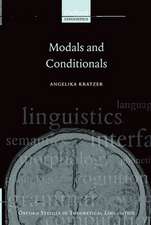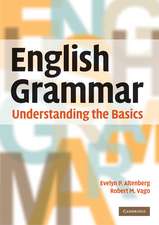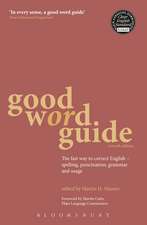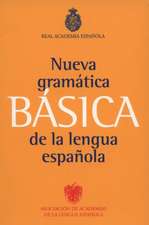Anaphora in Celtic and Universal Grammar: Studies in Natural Language and Linguistic Theory, cartea 14
Autor R. Hendricken Limba Engleză Hardback – 31 oct 1988
| Toate formatele și edițiile | Preț | Express |
|---|---|---|
| Paperback (1) | 640.55 lei 6-8 săpt. | |
| SPRINGER NETHERLANDS – 21 sep 2011 | 640.55 lei 6-8 săpt. | |
| Hardback (1) | 646.75 lei 6-8 săpt. | |
| SPRINGER NETHERLANDS – 31 oct 1988 | 646.75 lei 6-8 săpt. |
Din seria Studies in Natural Language and Linguistic Theory
- 24%
 Preț: 808.03 lei
Preț: 808.03 lei - 18%
 Preț: 788.72 lei
Preț: 788.72 lei - 18%
 Preț: 958.56 lei
Preț: 958.56 lei - 15%
 Preț: 600.26 lei
Preț: 600.26 lei - 18%
 Preț: 947.67 lei
Preț: 947.67 lei - 15%
 Preț: 646.62 lei
Preț: 646.62 lei - 18%
 Preț: 723.56 lei
Preț: 723.56 lei - 15%
 Preț: 604.84 lei
Preț: 604.84 lei - 18%
 Preț: 952.09 lei
Preț: 952.09 lei - 15%
 Preț: 642.51 lei
Preț: 642.51 lei - 18%
 Preț: 947.50 lei
Preț: 947.50 lei - 18%
 Preț: 1224.54 lei
Preț: 1224.54 lei - 15%
 Preț: 641.71 lei
Preț: 641.71 lei - 18%
 Preț: 2314.56 lei
Preț: 2314.56 lei - 18%
 Preț: 952.89 lei
Preț: 952.89 lei - 18%
 Preț: 1220.12 lei
Preț: 1220.12 lei - 15%
 Preț: 642.83 lei
Preț: 642.83 lei - 18%
 Preț: 944.19 lei
Preț: 944.19 lei - 15%
 Preț: 648.05 lei
Preț: 648.05 lei - 18%
 Preț: 952.57 lei
Preț: 952.57 lei - 18%
 Preț: 1729.61 lei
Preț: 1729.61 lei - 15%
 Preț: 644.95 lei
Preț: 644.95 lei - 15%
 Preț: 644.63 lei
Preț: 644.63 lei -
 Preț: 384.48 lei
Preț: 384.48 lei - 18%
 Preț: 1662.85 lei
Preț: 1662.85 lei - 18%
 Preț: 955.08 lei
Preț: 955.08 lei - 18%
 Preț: 952.40 lei
Preț: 952.40 lei -
 Preț: 386.81 lei
Preț: 386.81 lei
Preț: 646.75 lei
Preț vechi: 760.88 lei
-15% Nou
Puncte Express: 970
Preț estimativ în valută:
123.75€ • 129.56$ • 102.40£
123.75€ • 129.56$ • 102.40£
Carte tipărită la comandă
Livrare economică 05-19 aprilie
Preluare comenzi: 021 569.72.76
Specificații
ISBN-13: 9781556080661
ISBN-10: 1556080662
Pagini: 304
Ilustrații: XI, 285 p.
Dimensiuni: 155 x 235 x 22 mm
Greutate: 0.59 kg
Ediția:1988
Editura: SPRINGER NETHERLANDS
Colecția Springer
Seria Studies in Natural Language and Linguistic Theory
Locul publicării:Dordrecht, Netherlands
ISBN-10: 1556080662
Pagini: 304
Ilustrații: XI, 285 p.
Dimensiuni: 155 x 235 x 22 mm
Greutate: 0.59 kg
Ediția:1988
Editura: SPRINGER NETHERLANDS
Colecția Springer
Seria Studies in Natural Language and Linguistic Theory
Locul publicării:Dordrecht, Netherlands
Public țintă
ResearchCuprins
1 Introduction.- 1.1. The Descriptive and Theoretical Goals.- 1.2. An Overview of Government Binding Theory.- 1.3. An Overview of the Major Results of This Study.- 2 Celtic Agreement, the Avoid Pronoun Principle, and Binding Theory.- 2.1. Introduction.- 2.2. Breton Agreement Markers Determined by the Avoid Pronoun Principle.- 2.3. Generalizing the Analysis of Breton Agreement to Welsh.- 2.4. Evidence from the Binding Theory: Breton and Welsh Have a Null AGR.- 2.5. AGR as a SUBJECT for the Binding Theory.- 3 Raising and Passivization in Breton: An Argument for Anaphoric Traces.- 3.1. The Theoretical Status of Anaphoric Traces.- 3.2. The Breton Raising to Subject Construction.- 3.3. Raising Structures Parallel Passive Structures.- 3.4. Breton Raising and Pseudopassive: Further Implications.- 3.5. Conclusion.- 4 PRO-INFL and Reduced Structures.- 4.1. Reduced Structures Have Missing INFLs.- 4.2. Some INFLs Missing in Welsh and English Are PRO-INFL.- 4.3. Corroborating Evidence for the PRO-INFL Analysis.- 4.4. Contraction and Reduced Structures.- 4.5. A Competing Analysis.- 4.6. Breton is Consistent with the PRO-INFL Analysis.- 5 Government and the Connection Between Relative Pronouns, Complementizers and Subjacency.- 5.1. Introduction.- 5.2. Relative Pronouns in English.- 5.3. Relative Pronouns Are Pronominal Anaphors.- 5.4. Welsh and Breton Lack Relative Pronouns.- 5.5. Competing Analyses and Other Arguments.- 5.6. Conclusion.- 6 The Interaction of Government Theory with Synthetic Agreement.- 6.1. Introduction.- 6.2. The ECP Gives a Unified Treatment of Complementizers and Agreement in Welsh Movement Structures.- 6.3. Two Asymmetries in Breton and Welsh Extraction.- 6.4. Welsh and Breton Extraction from Negatives.- 6.5. Competing Analyses and Arguments.- 6.6. Subject-Object Asymmetries at LF and the ECP.- 6.7. Conclusion.- References.- Index of Languages.- Index of Names.















